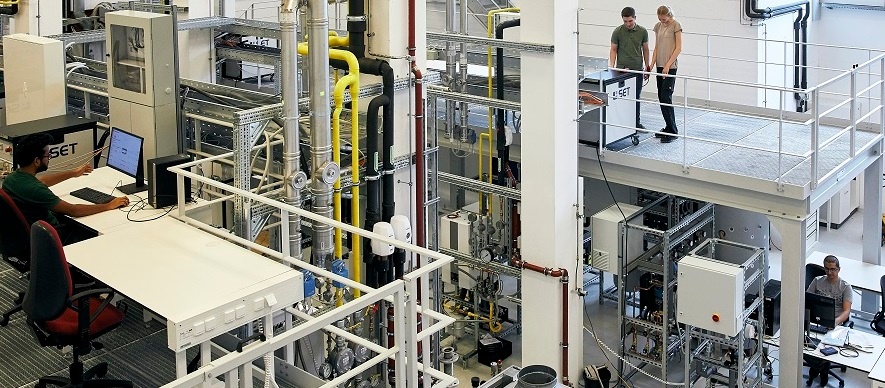Research Group
The Center for Combined Smart Energy Systems (CoSES) is a low-inertia, sector-coupled, low voltage active distribution grid laboratory to investigates smart operation strategies for sustainable energy systems at distribution grid prosumer levels. Our focus lies on the complex interaction of different subsystems, considering three integrated layers: thermal energy supply, electrical energy supply, communication & computation network. The research of our young group covers data driven model validation and calibration, real-time and optimal energy management, and dynamic control strategies of electrical and heat prosumers. The lab hosts the energy infrastructure of five realistic buildings, with real and emulated DERs, and a bidirectional interaction with the electrical and heating networks. The lab uses Power Hardware-in-the-loop (PHiL) philosophy to implement developed control and simulation models in real-time over a real long reconfigurable electrical grid and an emulated heating grid.
Topic Background
Power grid operators require massively upscaled monitoring of the active distribution grids, to leverage the flexibility potential from sector-coupled DER generation and demand profiles. Such a task is expensive and faces significant regulatory hurdles due to data privacy and sharing legislation in Germany. State estimation of the distribution grid, as traditionally common in transmission grids, to determine the voltage magnitude and phase at every node is necessary to prevent an inefficient over-dependence on physical measurement units.
Research Topic
The effectiveness and dependability of the power system state estimation, significantly hinge on the presence and quality of measurements. But due to insufficient number of sensors, suboptimal positioning, communication failure or topology changes, this problem turns unobservable in the mathematical sense. Traditional estimators that presume deterministic states, such as the weighted least squares (WLS) estimator, become unusable for unobservable problems, as they're imprecise and inconsistent under changing conditions. Consequently, new techniques such as pseudo-measurements, data driven approaches, graph theory based reductions and others need to be researched for a practical distribution grid state estimator.
Tasks:
• Literature review of state estimation algorithms, with emphasis on power systems
• Familiarization with the control system of CoSES laboratory.
• Familiarization with state estimation implementation frameworks.
• Building up co-simulation environment to collect training set, ground truth for a state estimator validation.
• Building a robust state estimation tool based on the literature research
• Benchmarking on a suitably chosen scenario set.
• Result processing, evaluation and presentation
• Preparation of a report describing the key aspects and findings of the conducted work
• Presenting the results to a scientific audience.
• Performing daily lab work duties of a student research assistant.
